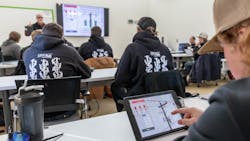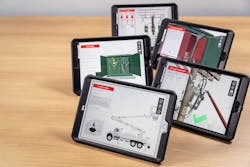Augmented Reality Training in Line Work
Editor's Note: This project will be highlighted at the 2025 T&D World Live Conference and Expo this Sept. 23-25 in Phoenix, Arizona. Session 203: MidAmerican Energy Tackles Workforce Development with AR and Multimodal Training will:
- Describe how multimodal learning enhances workforce training.
- Highlight measurable improvements in employee preparedness and performance.
- Share key takeaways for integrating AI and VR into utility training programs.
Come to the event to ask questions and advance the conversation around other crucial topics in the industry. Visit the events site to check out the program: For a 20% discount for T&D World readers, enter TDWREADER at checkout.
“Two-year wait times are commonplace, and it can be difficult to get students through fast enough to meet the needs of the workforce,” she said.
To address the continuing workforce constraints in the utility industry, Iowa companies joined forces to develop a curriculum for the electric utility technology/powerline program at Des Moines Area Community College (DMACC). The advisory committee tackling the labor shortage issue included representatives from two investor utilities, Iowa rural electric cooperatives, municipal utilities in Iowa, International Brotherhood of Electrical Workers (IBEW) and DMACC.
For MidAmerican, bringing the digital training curriculum to DMACC not only gives college students the opportunity to earn an associate’s degree in electric utility technology, but also extends the strategic investments the company has made in worker education.
Training the Next Wave of Lineworkers
MidAmerican first began exploring digital training back in 2017. A few years before, the company entered into an agreement with its labor unions to optimize resources by combining its two primary time-based gas apprenticeship programs into one competency-based hybrid program.
“The need for innovative, engaging training was evident, as apprentices were required to retain more information over a shorter period of time,” McCracken said. “MidAmerican turned to Index AR Solutions to help pair augmented reality-based visualizations with written content and other multimedia for a complete digital training curriculum that was put in the palm of every apprentice’s hand via a tablet in 2018.”
To date, MidAmerican has digital training curriculums for 13 apprentice programs either complete or in development. The interactive training technologies deployed by MidAmerican have proven valuable in supporting a younger, higher-turnover workforce. Employees in the first 10 years of their career have, on average, a median tenure of about three years on the job, compared to retiring workers who have on average about 10 years on the job.
So MidAmerican Energy partnered with DMACC. By building a strong relationship with the community college, the utility could jump-start a training program with help from technology partner Index.
The students enrolled in the line mechanic program at DMACC now have access to the same material and content deployed in MidAmerican’s own training centers. This approach ensures a consistent and predictable competency level of skill developed with each student.
“It is already field-proven and gives students a preview of the specific technologies, processes and procedures that they will experience if hired at MidAmerican,” says Don Finn, instructor at DMACC. “The content, delivered via assigned tablets, then becomes a reference material that workers take with them outside of the classroom. Ultimately, using the same training material builds excitement and gives students a great concept of what the job is really like.”
Learning the Technology
So far, the students have responded positively to the curriculum created by Index, Finn says. As with any technology, the virtual training curriculum has a learning curve for some users, even for younger students who have grown up around mobile devices. To help these students, the vendor works closely with DMACC to overcome any challenges with learning the technology.
In addition to delivering the training materials and iPads to DMACC administrators, Index provided ongoing support so instructors and students can gain maximum benefit from the course. Index team members hosted “train-the-trainer” sessions on-site for DMACC instructors, and they arranged weekly videoconference calls for students over the course of the semester to walk them through each eBook and app step by step. Because most of the students identify themselves as hands-on learners, they have been able to navigate the training program materials on the iPads.
In the Transformer Trainer application, students tap and drag across the screen to make wiring connections and then receive instant feedback on whether a connection was made correctly. Rather than having to flip through pages of text, students also enjoy the searchability of the tablet-based materials. Students can simply type in a search and quickly locate important topics. They can also bookmark a topic and type notes instream for reference later.
Transferring Knowledge
During the classroom portion of the training, Finn uses the tablet as a tool in class, walking through multimedia content and visualizations projected on a screen while students follow along on their own tablets at their desks. The instructor has also used the material to develop exams that the students complete during the year-long program.
“The digital curriculum is a fundamental shift in the way linemen are trained,” Finn says. “Instead of static, one-dimensional textbooks, apprentices now consume instructional material in the form of rich multimedia that is also interactive.”
The line mechanic course created by MidAmerican and Index includes nearly 1,000 eBook pages of vetted content and 200 instructional videos of actual line mechanics performing work and giving guidance. The videos also emphasize the importance of safety and commitment to customer service with seasoned workers who share wisdom and real-world stories from the field.
“MidAmerican’s represented workforce was highly engaged in the development of the digital curriculums, and hundreds of apprentices, journeymen and others participated in the content gathering process,” McCracken said. “Having safety-specific information delivered to apprentices and students by their fellow employees is a powerful tool to emphasize its importance.”
The tablets feature interactive Index mobile apps that use augmented reality (AR), three-dimensional models and animations to teach students how to identify key parts or complete common tasks, such as how to troubleshoot a transformer. The augmentations also walk students through the safety considerations and tools needed for each step and overlay critical information on to the component they are studying.
The interactive visualization apps such as Transformer Trainer make it easy for students to understand if they are performing a task correctly or incorrectly. Students feel rewarded when mastering a certain task for the first time and are more confident as they move on to the next concept.
“Because the material is consumed on a mobile device, students can then take their learning tool directly into the training yard and refer to it as they complete the task on real equipment,” Finn said.
Expanding the Program
With the training material delivered via tablets, the apprentices can access the information anywhere and anytime. Looking forward, MidAmerican is looking for a way to connect apprentices in the field back to trainers or subject matter experts when they need additional support.
To accomplish this goal, MidAmerican is exploring video-calling technology, such as FaceTime, so the apprentice can contact any trainer or subject matter expert remotely, show them the challenge they are facing and work through to a solution in real time. The company is also taking a close look at wearable technology, creating a hands-free tool for when apprentices are working on equipment both in training and in the field.
Amy Fischbach ([email protected]) is the Field Editor for T&D World magazine.
About the Author
Amy Fischbach
Electric Utilities Operations
Amy Fischbach is the Field Editor for T&D World magazine and manages the Electric Utility Operations section. She is the host of the Line Life Podcast, which celebrates the grit, courage and inspirational teamwork of the line trade. She also works on the annual Lineworker Supplement and the Vegetation Management Supplement as well as the Lineman Life and Lineman's Rodeo News enewsletters. Amy also covers events such as the Trees & Utilities conference and the International Lineman's Rodeo. She is the past president of the ASBPE Educational Foundation and ASBPE and earned her bachelor's and master's degrees in journalism from Kansas State University. She can be reached at [email protected].

